You Won’t Believe How Raising Rabbits as Indoor Pets Can Supercharge Your Garden
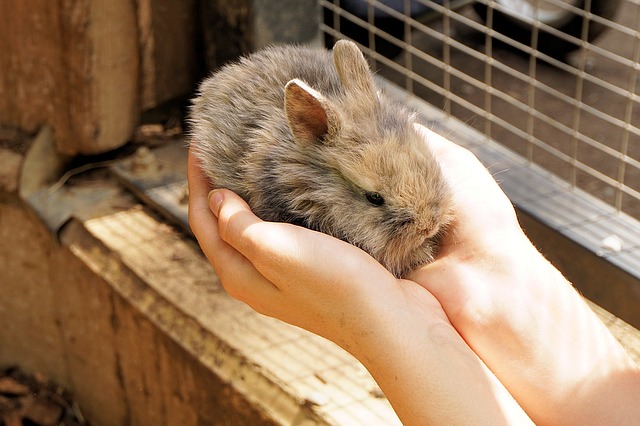
I have never been a pet guy, it’s not that I don’t like animals, I just don’t like all the extra work that comes with maintaining them. Well when you have four young kids they can be very convincing. After years of begging for pets, I finally gave in and decided to get a couple house rabbits.
Of course as an avid gardener I knew they would provide some benefits for me as well as fill my kid’s desire for a pet, so it naturally seemed like a win-win.
Rabbits as House Pets
When you think of rabbits, it’s generally not an animal you think of roaming around your living room. It’s also an animal that you’re most likely trying to keep away from your garden versus using to help build your gardening.
Believe it or not, bunnies make for amazing house pets! If you like a pet that is quiet, has a unique personality, develops a bond with you, doesn’t require a ton of space, is intelligent, and can be trained, provides marvelous garden fertilizer, then a rabbit will work for you.
Do House Rabbits Smell?
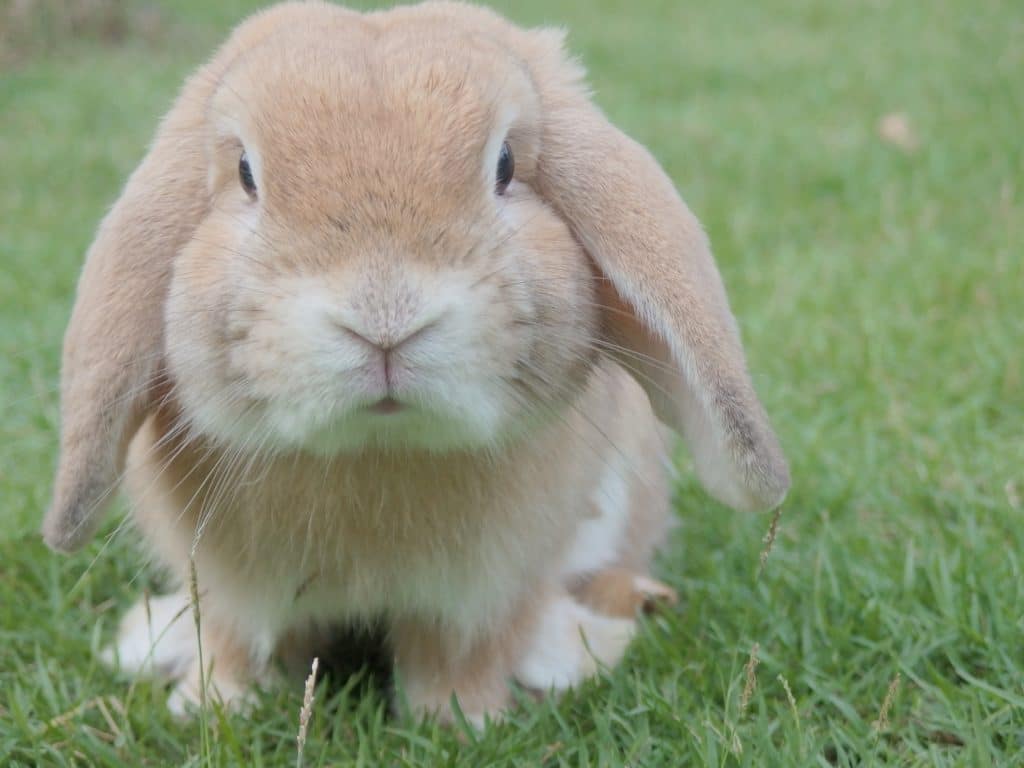
This was one of my major concerns with having rabbits indoors. Initially my plan was to keep them in a permanent spot outside, but living in the Phoenix Arizona desert presents many problems with trying to raise rabbits in our intense heat.
After doing some research, I decided that keeping them indoors was the way to go. Rabbits are really clean animals and pride themselves on grooming habits. Their droppings are virtually odorless. The droppings look like little dry balls, think Kix cereal made with alfalfa, so they aren’t mushy, and are easy to clean up.
The odor comes from a rabbit’s urine. Rabbits can easily be trained to use a litter box and like to go in the same area. As long as you’re keeping the litter box clean and fresh the odor is very minimal. I use just a standard cat litter box with pine pellets and hay.
A diluted vinegar mix is very effective with neutralizing odor if the rabbit has an accident somewhere. I mix a spray bottle with 50-50 water and vinegar. This is also applied to the litter box when changing the bedding.
Quick Tips for Litter Training a rabbit:
- Put the litter box in a corner
- Use a safe litter, some can be harmful if rabbits eat it. I prefer pine pellets (kiln dried) for the smell and garden benefits.
- Move it to the area they like to go
- Put their food in the litter box
- Use hay with their litter to line the box
- Don’t yell or physically harm them if they have an accident
- Start in a Small location
- Move any droppings outside the box into the box
- When you see your rabbit using the box praise and reward them
What’s my Investment?
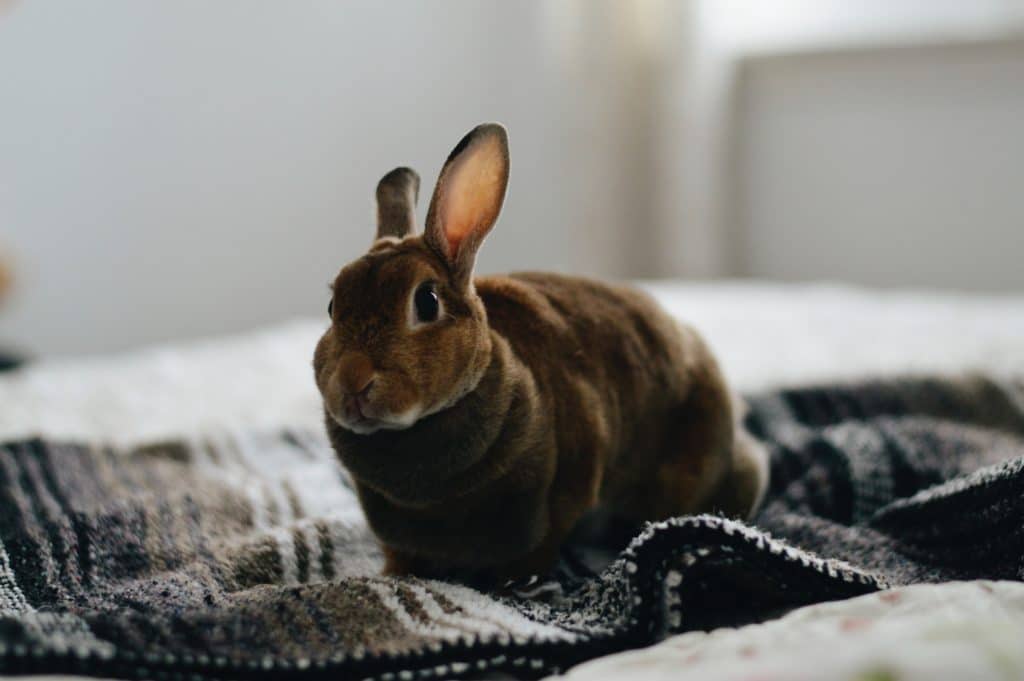
As with any pet there are going to be upfront costs and ongoing expenses. Fortunately when compared to some other pets, rabbits are quite affordable. There are several varieties of rabbits with various costs associated with them. I have Lago’s which were only $10 a piece.
Rappitpedia has a great list of different types of rabbits. The most expensive cost for rabbits is getting them spayed and neutered. It can be several hundred dollars for these procedures with having a female spayed being about five times the cost of neutering a male. This is extremely important for a few reasons.
One, rabbits reproduce rapidly, so unless you intend to breed them, get it done early. Two, rabbits are territorial and will spray to mark their territory. Getting a male neutered will alleviate that problem. Lastly, female rabbits have a high risk of developing ovarian cancer without being spayed which prevents them from living a long life.
Here are some of the initial and ongoing costs with rabbits:
- Cage– Here is the one I purchased for Amazon. I like that it is large enough for the rabbits to roam around.
- Litter Box– Just a standard cat box works. This is what I use here.
- Water Bottle and/or Dish– Click here to see my favorite on Amazon.
- Toys– Rabbits are very social animals and can become depressed with no stimulation. Click here for Rabbit Toys.
- Rug– I lay a rug under the cage for added protection.
- Brush– Click here to see my favorite on Amazon.
- Hay– Their are many different options. Click here to see my favorite on Amazon. I prefer to get a half bail locally for around $15 that lasts months.
- Pellets– I buy a 40lb bag from Tractor Supply that costs $15 and lasts several months.
Basic Care Tips for Rabbits
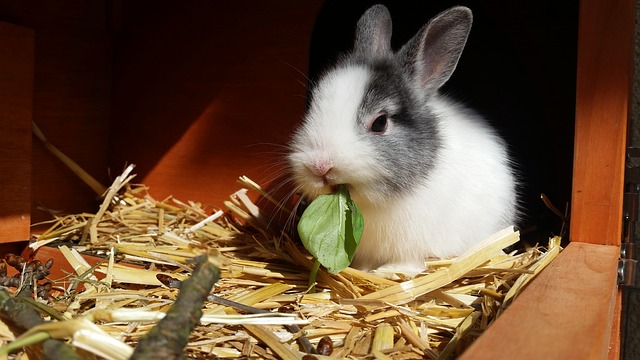
Contrary to what you may have seen when it comes to raising rabbits, keeping them confined in a small wired cage is inhumane. These are a few tips for keep your bunnies healthy and happy.
Exercise
Rabbits need regular exercise, space to move around, and something that doesn’t harm their feet. You’ll want to let them out of the cage in an area to run around for a period of time several times per week.
Rabbits like to chew, so bunny proof any areas where rabbits may roam. All wires should be guarded and watch out for baseboards or other wood.
Feeding
A rabbit’s main diet should consist of a high quality timothy hay or orchard grass. When young alfalfa is the better option. Pellets can be used to supplement with hay. I feed my rabbits a ¼ cup of pellets each morning. Rabbits can eat many vegetables and some fruits sparingly.
A variety is best so rabbits can get various nutrients. These can be introduced as rabbits get to be about 6 months old, but should always be in small amounts. If you notice sludge in urine or runny stools. Stop immediately. Rabbits have sensitive digestive tracts.
Grooming
Rabbits can frequently shed, so periodically brushing them can help reduce the amount of hair build up. This will also prevent problems from rabbits ingesting hair balls.
Placing wooden toys and objects within the cage can help rabbits maintain healthy teeth. Rabbit’s teeth are always growing, so they need something to help wear them back down. Nails will also need to periodically be clipped.
Handling
Even though rabbits are cute and cuddly, they generally don’t like to be handled. When picking up keep your hand securely under the torso and the bunny close to your body. Rabbit’s bones are fragile, especially when young, so be careful not to squeeze too much.
Bunnies get startled when picked up and tend to kick their powerful hind legs. Watch your children around the rabbits and encourage them to allow the bunnies to come to them for petting and snuggling.
Using Rabbits for Improving your Garden
Rabbit manure packs a huge punch! Adding this wonderful fertilizer will encourage lush, green growth, and nutrients for high quality fruit/vegetable production. Worms gravitate to rabbit manure which leads to building a rich, healthy soil.
It improves the structure of your soil making nutrients more accessible for plants and for aeration. Horse manures put off a scent that many find offensive, while rabbit manure is virtually odorless.
Recommended Post: How to improve Clay Soil for Fruit Trees
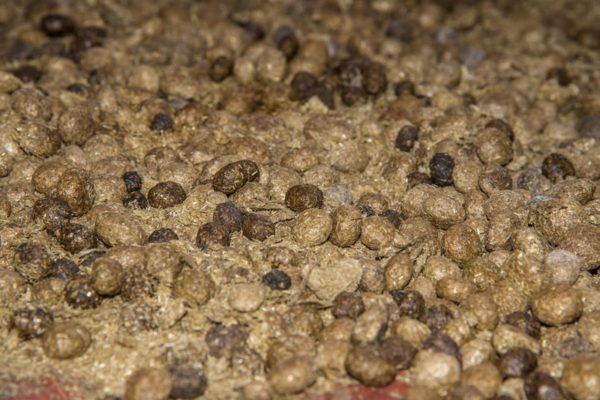
Using Rabbit Manure as Garden Fertilizer
My first couple years of gardening in desert were a challenge to see the least. One year, I was gifted a bag of rabbit manure that I used when planting tomatoes. Those tomato plants became massive, healthy, and extremely productive. After that I was a big believer in the power of rabbit manure for the garden.
Now it’s become a staple on everything I grow and the results speak for themselves. Rabbit manure is considered a “cold manure” meaning it can be applied directly to the garden without having to age it. Rabbit manure nutrient content is 2.4% N, 1.4 P, 0.6 K with other trace elements like copper, calcium, boron, magnesium, zinc, copper, manganese, sulfur, and cobalt.
Adding the pine litter, which is naturally acidic, can help aid in reducing high PH levels in soils. The hay also provides an additional mulch and nutrient source. If you’re looking to make a little money on the side many gardeners will gladly pay for bags of this garden gold or make a rabbit tea to sell.
Recommended Post: Should I use Manure for Fruit Trees
Final Thoughts
Rabbits make for great household pets. They’re very social creatures and are fun to observe. Not only are that, but they’re relatively low cost, low maintenance, and easy to care for. Raising indoor rabbits as pets has the added benefit of providing you with manure that provides fertilizer needs, creates healthy soil, and helps produce a bountiful harvest.
